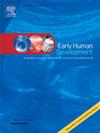“A word that describes it well is ‘lonely’” – Experiencing preterm birth during the first COVID-19 lockdown in Germany: A qualitative study
IF 2.2
3区 医学
Q2 OBSTETRICS & GYNECOLOGY
引用次数: 0
Abstract
Background
During the first pandemic lockdown restrictive regulations were implemented in hospitals. Parents of preterm babies were particularly affected due to a long hospital stay. The aim of this study is to investigate how pandemic regulations during the first lockdown impacted the birth and perinatal experiences of parents of preterm babies.
Methods
For this qualitative study, we interviewed ten parents who had a preterm baby (28 to 32 gestational weeks) during the first lockdown in Germany. The interviews were analysed using reflexive thematic analysis.
Results
Five themes were identified 1) “Loneliness of pregnant mothers at risk at the maternity ward”, highlights the lack of physical and emotional support, intensified by a tense atmosphere at the hospitals 2) “Losing out on meaningful moments” describes the feeling of being cheated of a ‘real’ birth experience and missing out on the ‘normal life at home’ with a newborn 3) “Fear as a constant companion” refers to the fear of a COVID-19 infection during the hospital stay and ambivalent feelings upon arriving home 4) “Medical care of preterm infants during the pandemic” emphasizes the gaps in medical care of preterm infants but also underscores what went well despite pandemic restrictions and 5) “Mothers taking action to change hospital regulations” portrays their agency.
Conclusion
It is crucial to include scientific, pediatric expertise in future pandemic response planning to rapidly visualize and prevent negative consequences of mitigations measures, such as those described in this study. Protecting elements of family-centered and integrated care should be a priority.
“一个词可以很好地描述它,那就是‘孤独’”——在德国首次COVID-19封锁期间经历早产:一项定性研究
在第一次大流行封锁期间,医院实施了限制性规定。由于住院时间长,早产儿的父母受到的影响尤其严重。本研究的目的是调查第一次封锁期间的大流行法规如何影响早产儿父母的出生和围产期经历。方法在这项定性研究中,我们采访了10位在德国第一次封锁期间有早产儿(28至32孕周)的父母。访谈采用反身性主题分析进行分析。结果确定了五个主题:1)“产科病房风险孕妇的孤独感”,强调缺乏身体和情感支持;加剧了紧张的气氛在医院2)“失去意义的时刻”描述了被欺骗的感觉出生的“真实”的经验,错过了新生的“正常生活”(3)“恐惧常伴”指的是害怕COVID-19感染住院期间和矛盾的感情到家4)“早产儿在大流行期间的医疗护理”强调早产儿的差距在医疗,但也凸显了什么尽管有流行病的限制,但进展顺利,《母亲们采取行动改变医院规定》描绘了她们的机构。在未来的大流行应对规划中纳入科学的儿科专业知识至关重要,以快速可视化和预防缓解措施的负面后果,例如本研究中描述的那些。保护以家庭为中心的综合护理的要素应是一项优先事项。
本文章由计算机程序翻译,如有差异,请以英文原文为准。
求助全文
约1分钟内获得全文
求助全文
来源期刊

Early human development
医学-妇产科学
CiteScore
4.40
自引率
4.00%
发文量
100
审稿时长
46 days
期刊介绍:
Established as an authoritative, highly cited voice on early human development, Early Human Development provides a unique opportunity for researchers and clinicians to bridge the communication gap between disciplines. Creating a forum for the productive exchange of ideas concerning early human growth and development, the journal publishes original research and clinical papers with particular emphasis on the continuum between fetal life and the perinatal period; aspects of postnatal growth influenced by early events; and the safeguarding of the quality of human survival.
The first comprehensive and interdisciplinary journal in this area of growing importance, Early Human Development offers pertinent contributions to the following subject areas:
Fetology; perinatology; pediatrics; growth and development; obstetrics; reproduction and fertility; epidemiology; behavioural sciences; nutrition and metabolism; teratology; neurology; brain biology; developmental psychology and screening.
 求助内容:
求助内容: 应助结果提醒方式:
应助结果提醒方式:


